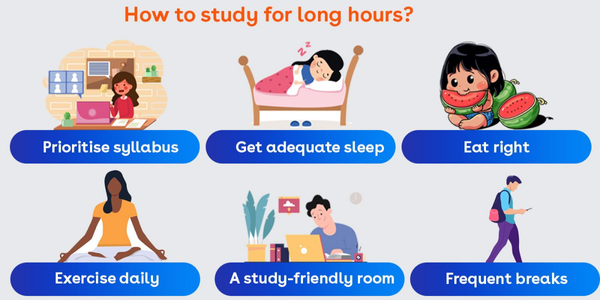Have you ever sat down with the best intentions to study, only to find yourself scrolling through social media or suddenly cleaning your room? You’re not alone. In today’s distraction-filled world, learning how to focus better while studying is more important than ever. Whether you’re a student prepping for finals or a professional upskilling for your career, mastering concentration can make or break your success.
In this post, we’ll explore real-world strategies backed by psychology and neuroscience to help you sharpen your focus, beat procrastination, and study smarter—not harder.
Why Is It So Hard to Focus While Studying?
Our brains are not naturally wired for long periods of sustained concentration—especially in an age of constant notifications and digital interruptions.
Common Focus Killers
-
Smartphones and social media
-
Lack of clear study goals
-
Mental fatigue or burnout
-
Uncomfortable or noisy environments
-
Poor time management
-
Multitasking habits
By identifying and understanding these distractions, we can begin to build effective strategies to overcome them.

The Science Behind Focus and Attention
Understanding how your brain works is key to unlocking better concentration.
Meet Your Prefrontal Cortex
This is the part of the brain responsible for decision-making, attention, and self-control. However, it tires easily. That’s why after a few hours of intense focus, you might feel mentally drained.
Attention Span Is Trainable
Just like physical muscles, your ability to focus can improve with regular practice and the right techniques. The more you train your brain to concentrate, the easier it becomes.
How to Focus Better While Studying: 12 Proven Tips
1. Set Clear, Achievable Study Goals
Start every session by defining exactly what you want to accomplish. This gives your brain direction and helps prevent wandering thoughts.
Example:
Instead of “study biology,” try “review and summarize Chapter 5 on cell division.”
2. Use the Pomodoro Technique
Work in focused 25-minute intervals followed by a 5-minute break. After four sessions, take a longer 15–30 minute break.
Why it works: It leverages your natural attention cycle and prevents burnout.
3. Create a Distraction-Free Study Environment
Design a space that signals “focus mode” to your brain.
Tips:
-
Use noise-canceling headphones or ambient music
-
Keep your phone in another room or use app blockers
-
Declutter your desk to reduce visual distractions
4. Practice Mindfulness or Meditation
Mindfulness helps train your brain to bring attention back when it wanders.
How to get started:
-
Try a 5-minute breathing exercise before you study
-
Use meditation apps like Headspace or Calm
5. Prioritize Sleep, Nutrition, and Hydration
Cognitive performance plummets when you’re tired, hungry, or dehydrated.
-
Sleep: Aim for 7–9 hours a night
-
Nutrition: Include brain foods like nuts, berries, and leafy greens
-
Water: Keep a water bottle on hand and sip regularly

6. Break Large Tasks into Smaller Chunks
Breaking down big tasks makes them feel more manageable and less intimidating.
Instead of: “Write a 10-page paper”
Try: “Write outline,” “Draft introduction,” “Write body paragraphs,” etc.
7. Find Your Peak Study Hours
Are you more alert in the morning or evening? Align your study sessions with your natural rhythm.
Tip: Track your energy levels for a week and schedule your hardest tasks during your peak focus time.
Tools and Apps to Improve Study Focus
8. Use Focus Apps and Timers
-
Forest App: Stay focused by growing virtual trees
-
Focus@Will: Music engineered to improve concentration
-
Cold Turkey / Freedom: Block distracting websites and apps
9. Leverage Study Techniques That Keep You Engaged
-
Active recall: Test yourself instead of just re-reading notes
-
Spaced repetition: Review material at increasing intervals (try Anki or Quizlet)
-
Feynman technique: Teach the concept in your own words as if to a 5-year-old
10. Incorporate Movement Breaks
Sitting too long can cause brain fog. Get up and move every 30–60 minutes.
Quick options:
-
5-minute stretch
-
Walk around the room
-
20 jumping jacks

Creating a Study Ritual That Boosts Focus
11. Build a Pre-Study Routine
Consistent cues help trigger focus. Try this simple ritual:
-
Clear your workspace
-
Put on study music or white noise
-
Open only the materials you need
-
Take a few deep breaths and start your timer
Bonus: Always begin at the same time each day to train your brain into “study mode.”
12. Keep a Distraction Journal
Every time you feel the urge to check your phone or wander off-task, jot it down.
Why it works: It creates awareness of your triggers and allows you to deal with them later without breaking focus.
Real-World Example: How Sarah Mastered Focus in 30 Days
Sarah, a 21-year-old university student, used to struggle with procrastination and poor focus. After failing an important exam, she decided to overhaul her study habits.
What She Did:
-
Adopted the Pomodoro method
-
Created a minimalist study space
-
Turned her phone on airplane mode during study time
-
Used Forest to stay motivated
-
Reviewed material with active recall daily
The Result:
In just one month, Sarah’s GPA improved, she finished assignments ahead of deadlines, and, most importantly, she felt in control of her academic life.

Common Mistakes to Avoid
Even with the best intentions, some habits can sabotage your focus.
Don’t:
-
Study for hours without breaks
-
Multitask (e.g., watching videos while studying)
-
Cram the night before
-
Underestimate the power of environment
Avoiding these traps will help you stay on the path to better concentration.
Final Thoughts: Consistency Is the Key
Learning how to focus better while studying is a skill—not a switch you flip overnight. Be patient. The more you implement these strategies, the more natural they become.
You don’t need to be perfect. Start small. Try one or two techniques this week, then build from there. Your brain will thank you.
Call to Action
What’s your biggest study distraction—and how are you planning to beat it?
Comment below to share your focus struggles or success stories. Want more productivity tips? Explore our related posts on memory techniques and effective note-taking!


